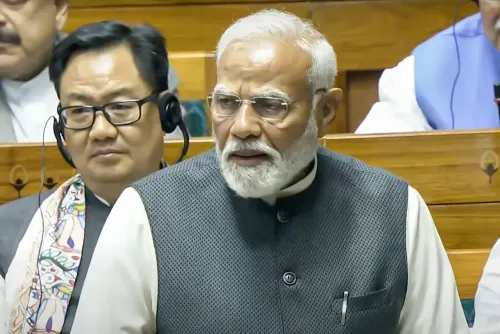Connecting India and GCC through AI: A Pathway for Innovation and Growth

Synopsis
Key Takeaways
- AI can enhance supply chain management and logistics.
- India and GCC can collaborate on ethical AI guidelines.
- Joint Action Plan 2024-2028 aims to deepen cooperation.
- Investment in AI can create jobs in both regions.
- Addressing AI-related challenges is crucial for progress.
New Delhi, March 10 (NationPress) Recently, India's External Affairs Minister, Dr. S. Jaishankar, traveled to Riyadh, Saudi Arabia, for the inaugural India-GCC Joint Ministerial Meeting focused on Strategic Dialogue. During this meeting, the minister underscored the significant role of the Gulf Cooperation Council (GCC) for India, referring to it as India's "extended" neighborhood.
A major outcome of this meeting was the endorsement of the Joint Action Plan 2024-2028, aimed at fostering collaboration in key sectors including healthcare, security, transportation, agriculture, energy, and food security. It was also agreed that additional areas of cooperation would be incorporated into the Joint Action Plan through mutual consensus at later dates.
In this context, technology emerges as a crucial factor in strengthening and ensuring the fairness of this collaboration. Emerging technologies, particularly AI, hold immense potential to enhance various sectors and promote inclusive growth and development. Notably, AI represents a new frontier in the global technological arena, with nations competing to establish dominance. It has transcended being a mere buzzword in international relations, radically transforming all facets of modern society with broad implications for the future. As India and Gulf nations aim to elevate their strategic alliance, AI could serve as a fundamental driver for increased collaboration and mutual prosperity. The GCC, which includes Saudi Arabia, the UAE, Qatar, Kuwait, Bahrain, and Oman, has become a significant economic and strategic partner for India. Besides the strong trade and investment dynamics, a growing alignment of interests has emerged between India and the GCC on regional security and counter-terrorism, driven by various geopolitical commitments. In this regard, leveraging the increasing strategic alignment, AI can further enhance the India-GCC partnership.
One significant area where AI can bolster India-GCC cooperation is in supply chain management and logistics. Innovative AI technologies such as predictive analytics, autonomous vehicles, and robotics can optimize and streamline supply chain processes, yielding cost efficiencies and improving responsiveness. Countries like Oman are already investigating AI adoption to boost logistics growth, while the UAE, Saudi Arabia, and Qatar have made remarkable progress in integrating AI across different sectors. All GCC nations have developed their own AI strategies and action plans to revamp their economies and societies.
Saudi Arabia created the Saudi Data and AI Authority in 2019 to spearhead its AI strategy. Meanwhile, the UAE launched the Ministry of AI in 2017 and unveiled the National Strategy for AI 2031 aimed at embedding AI throughout various sectors. Qatar introduced its National Artificial Intelligence Strategy in 2017 to incorporate AI in fields such as healthcare, education, and transportation. Similarly, Bahrain issued guidelines in 2019 to promote the responsible and ethical implementation of AI across government bodies. Other GCC nations, like Kuwait, collaborated with Microsoft in 2019 to enhance government officials' skills in utilizing AI and digital technologies, while Oman embarked on AI projects in 2020 for a Smart City Platform to improve traffic management, water conservation, and waste management.
On the flip side, India has positioned itself as a prominent AI powerhouse. Under Prime Minister Narendra Modi, India has rolled out an ambitious National AI Strategy that seeks to leverage the country’s robust IT landscape and skilled workforce to establish itself as a global leader in AI innovation. This indicates India's substantial potential to support GCC countries in accelerating their AI integration and application.
Hence, India and GCC nations can collaborate to harness AI's power to tackle shared socio-economic challenges and unveil fresh avenues for growth. India can impart its expertise in crafting cost-effective AI solutions tailored to local requirements, while the GCC can utilize its financial capabilities and infrastructure to scale AI initiatives. Gulf nations possess the financial assets and readiness to heavily invest in advanced technologies to diversify their economies beyond hydrocarbon dependency. By capitalizing on their complementary strengths, India and the GCC can forge a formidable AI alliance that propels innovation, addresses regional issues, and positions both as front-runners in the AI revolution.
The recently ratified India-GCC Joint Action Plan 2024-2028 lays the groundwork for deepening cooperation in AI and other emerging technologies. During the ministerial gathering, India's foreign minister, S. Jaishankar, remarked that “the demands of AI, electric mobility, and green growth underscore the importance of sharing human resources.” In this context, collaborative endeavors may yield innovative AI solutions tailored to the unique needs of both regions, especially in sectors such as healthcare, smart cities, and agriculture. For example, India's software development and data analytics expertise can complement the GCC's focus on infrastructure and urban development. GCC nations can invest in Indian startups and research initiatives, cultivating a dynamic ecosystem for AI innovation. Such investments can generate employment opportunities in both regions, particularly in technology and research.
Simultaneously, as AI becomes increasingly prevalent, it is essential for India and the GCC to address the associated risks and challenges. A survey by the Oliver Wyman Forum indicated that while the GCC region leads in adopting generative AI, with 74% of workers in the UAE and 68% in Saudi Arabia using it weekly, several challenges persist. Notably, 61% of UAE workers and 57% in Saudi Arabia reported inadequate training on the safe and responsible use of AI tools. Additionally, 92% of UAE workers have unintentionally exposed company data while using generative AI applications. Furthermore, 82% of UAE workers express concerns that the growing presence of AI may ultimately render their current roles obsolete.
Conversely, India faces its own specific challenges in AI development and deployment, including insufficient infrastructure, lack of public funding, information asymmetries, and the absence of well-defined regulatory frameworks. Thus, by combining resources and knowledge, both regions can accelerate the development of new AI applications, enhancing global competitiveness, as generative AI technologies can be harnessed to expedite innovation in product development cycles. Furthermore, AI can bolster cross-border collaboration in critical domains such as cybersecurity, counter-terrorism, and disaster management. Advanced AI systems can analyze real-time data, identify threats, and coordinate response mechanisms across borders, thus fortifying regional security and resilience. Consequently, sharing knowledge on AI regulation, data privacy, and cybersecurity best practices can assist both regions in building robust AI ecosystems.
Nonetheless, experts in AI technology highlight that the unregulated deployment of AI technologies raises ethical concerns, especially regarding bias, accountability, and transparency. Therefore, both regions must collaborate to establish ethical guidelines that govern AI utilization. The potential societal impacts of AI, such as job displacement and inequality, must be addressed cooperatively to ensure equitable distribution of AI benefits across both regions. By jointly formulating ethical principles for AI development and deployment and ensuring that both regions prioritize transparency, accountability, and fairness in their AI initiatives, India and the GCC can emerge as responsible global leaders in the AI domain. To tackle the challenges related to AI adoption, companies in GCC countries and India should implement strategies such as providing clear guidelines and high-quality training to safeguard sensitive data; addressing employee concerns about AI's impact on jobs through transparent communication and retraining programs; and instituting a robust change management protocol to make AI adoption a collective goal among the workforce.
In conclusion, it is crucial to recognize that the strategic partnership between India and the Gulf Cooperation Council represents a unique opportunity to expedite the adoption and application of artificial intelligence for mutual advantage. By merging India's technological expertise with the GCC's financial resources and infrastructure, both regions can stimulate innovation, tackle shared challenges, and enhance regional security and resilience. However, it is vital that both regions collaborate to mitigate the risks and ethical dilemmas associated with AI, ensuring that the advancement and deployment of these technologies are governed by principles of transparency, accountability, and social responsibility. Through a cooperative approach, India and the GCC can harness the transformative potential of AI to strengthen collaboration and secure a prosperous and sustainable future for both regions.
(Sudhanshu Kumar is a tech analyst and a doctoral candidate at the Centre for Russian and Central Asian Studies at Jawaharlal Nehru University.)
(Rashi Randev is a geopolitical analyst and a doctoral candidate at the Centre of Canadian, US and Latin American Studies at Jawaharlal Nehru University.)










